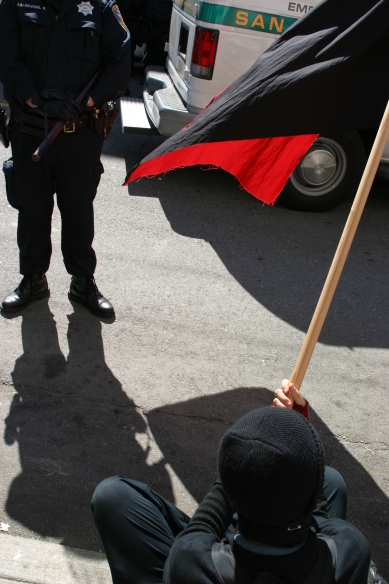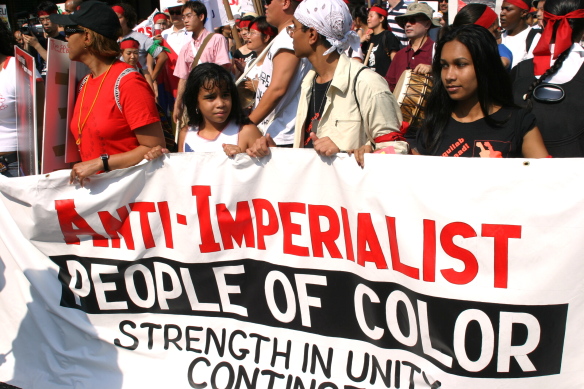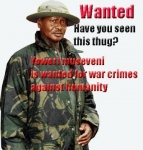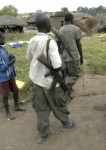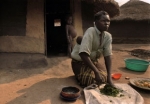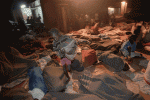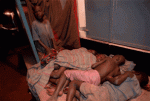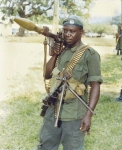People's Media:
This paper discusses Direct Action - the proper method of anarchist activist action. In it I try to consider some theoretical issues that we don't usually get a chance to discuss in the midst of political campaigns. Some of the issues raised will be, the role of anarchists in other political movements, the difference between direct action and symbolic action, the various traditional types of direct action and the proper attitude of activists towards the police and the media.
* * * * * * * *
"Direct Action" is the distinctive contribution of anarchists in the realm of political method. While reformists advocate the ballot box, liberals have their lobbying and their letter writing, bureaucrats have their work through "the proper channels" and socialists have their vanguard parties, we anarchists have direct action. Political tendencies other than anarchism may adopt direct action as a method but its historical origins and its most vigorous proponents are anarchist. Because direct action is a political method, before we can properly understand it and its place in anarchist practice we must first examine the nature of anarchist political activity.
Ideally, anarchist political activity promotes anarchism and attempts to create anarchy. It seeks to establish a society without capitalism,patriarchy or State, where people govern themselves democratically without domination or hierarchy. As I have argued elsewhere, this is an activity which is inescapably revolutionary in nature and which is best carried out collectively in an organisation dedicated to that purpose. While anarchists remain without a political organisation of their own, the main avenue for promoting anarchism is to participate in, contribute to and provide leadership in other political movements. Our objective in participating in other political movements and campaigns should be to show that anarchist methods and ways of organising work. The best advertisement for anarchism is the intelligence of the contributions of our activists and the success of our methods. Anarchists should strive to provide living examples of anarchy in action. As we will see, direct action is one of the best possible ways of doing this.
Two dangers in Anarchist Political Practice
Before I go on, I want to highlight here two problems which may occur with anarchist political activity which both stem from a tendency to be utopian in our political demands. Anarchists are often utopian in their rejection of any political activity oriented towards the state and in their failure to establish a realistic connection between their ends and their means. This sort of utopianism is not a virtue but instead contributes to anarchism's continuing political irrelevance to the majority of Ugandans.
Anarchism and the State.
In a capitalist economy the activities of "private enterprise" are rigorously excluded from public scrutiny and control. We have no input into the decisions about production and investment which determine the basic conditions of our existence and which are made in corporate board rooms. In many cases, if we don't like what we see happening around us, the only option open to us is to try to change government policy. Thus most forms of politics today are oriented towards the state. Most obviously, electoral politics seeks to determine the identity of those few individuals who supposedly "control" the state. Most forms of "political protest" also hope to induce, or to force, the state to take some action to address the protesters' concerns. Yet anarchism is largely defined by its rejection of the state as a mode of organising to meet social needs and anarchists have traditionally - and rightly - been extremely suspicious of any suggestion that we can succeed in using the state to serve our ends. It may therefore be tempting for anarchists to proffer "social revolution" as the solution to all problems.
Anarchists may argue that the problems that people face are the results of an insane social and economic order and that only a revolution and consequent creation of anarchy will solve them. But people have problems and face difficulties here and now which need to be addressed and they cannot wait for the revolution to solve them. Thus in rejecting attempts to force the state to address our needs or serve our political ends we must offer realistic alternative methods of achieving our goals, if we are to be relevant to the struggles of people today. Sometimes this may be possible. Sometimes we can organise together, without relying on the state, to address and solve our problems here and now. As we shall see below, this is the essence of "direct action".
Often, however, it won't be possible to provide genuine solutions to people's problems, within the existing order, without recourse to the state. Whether we like it or not certain social needs are, in current circumstances, only going to be addressed by the state. Access to medical resources, secure housing, educational qualifications or income support are for most people only going to be available as the result of state action. Relations between the sexes are also another area where the state seems to be the only plausible existing instrument of social policy. Domestic violence protection orders and state funded IDP camps may not be much of a solution to the problems created by violent or abusive partners but for some women they are all there is. For many women they are a necessary step on the road to escaping a cycle of abuse. The society wide education campaigns which are necessary to challenge sexist attitudes likewise can only be carried out with state support.
Until anarchists constitute a sizeable portion of the community and are capable of providing these services - or alternatives - themselves, activists concerned about these issues will be justified in turning to the state for help in addressing them.
Furthermore, legislation by the state *can* represent a real political victory. This may be because the passing of legislation acknowledges and gives weight to changes which have already occurred in the political consciousness of society at large or it may be because the legislation actually makes a real difference to the living conditions of ordinary people. Legislation guaranteeing a minimum wage, public health-care, health and safety standards at work or a decent standard of living for those excluded from work represents a genuine political victory for the majority over NRM-O. Not only do such state provided services make a vast difference in the quality of life of those who otherwise would have no or little access to them but they also dramatically increase the possibility of political action. The less time Wanainchi have to spend struggling to meet their basic needs, the more time they have to criticise and challenge the existing order.
The traditional anarchist hostility towards the Museveni's state then should be tempered by the recognition that, while it continues to exist, it is an important site of class struggle. If we reject attempts to exert pressure on the regime we may render ourselves irrelevant to the real needs of large elements in society. Calling only for revolution is not going to interest anyone who needs real change now. Anarchists must provide workable solutions for Wanainchi here and now. Sometimes this will involve recourse to the state.
Anarchism and Ends and Means.
One of anarchism's historical strengths has been its insistence on the connection between ends and means. Anarchists have insisted that libertarian outcomes will not result from authoritarian means and, more generally, have been sensitive towards the ways in which compromises made in the realm of political methods may corrupt us or infect our goals. Sometimes, however, this has lead to an over simplistic equation betweens our means and our ends. Anarchists often fail to address properly the *political* question of how our methods relate to our goals. An example of this is the pacifist claim "If everyone refused to fight there would be no wars" Now this is clearly true, in fact tautologically so. But pacifism does not follow from this truism. It does *not* follow that the best way to prevent wars is to make an individual commitment to refuse to fight in them. The connection between our actions and the goal of peaceful world is a *political* one. It is political because it involves the workings of the whole set of power and economic relations which structure our social and personal decision making. For our activities to have their intended effect they must be taken up by others and whether or not this will take place will depend on a whole set of political and economic factors. It is not at all clear that our refusing to fight will cause sufficient numbers of others to do so and thus make war impossible (in fact, this just seems wildly implausible). The best way to prevent wars may be to address the social systems and the injustices which cause them. It may even involve fighting.
More generally then, for our means to be suitable to the ends we seek we must be able to tell a realistic story about exactly how our activities will bring our ends about. This story will have to take account of the economic and political realities which affect our lives. It is often not realistic to believe that everyone else around us will immediately follow our example.
The best forms of anarchist politics avoid these two forms of dangerous utopianism and offer people genuine hope and occasional success in their struggle for a better world. Direct action is a crucial component of such a politics.
Direct Action.
The distinguishing feature of direct action is that it aims to achieve our goals through our own activity rather than through the actions of others. Direct action seeks to exert power directly over affairs and situations which concern us. Thus it is about people taking power for themselves. In this it is distinguished from most other forms of political action such as voting, lobbying, attempting to exert political pressure though industrial action or through the media. All of these activities aim to get others to achieve our goals for us. Such forms of actions operate on a tacit acceptance of our own powerlessness. They concede that we ourselves have neither the right nor the power to affect change. Such forms of action are therefore implicitly conservative. They concede the authority of existing institutions and work to prevent us from acting ourselves to change the status quo.
Direct action repudiates such acceptance of the existing order and suggests that we have both the right and the power to change the world. It demonstrates this by doing it. Examples of direct action include blockades, pickets, sabotage, squatting, tree spiking, lockouts, occupations, rolling strikes, slow downs, the revolutionary general strike. In the community it involves, amongst other things, establishing our own organisations such as food co-ops and community access radio and tv to provide for our social needs, blocking the freeway developments which divide and poison our communities and taking and squatting the houses that we need to live in. In the forests, direct action interposes our bodies, our will and our ingenuity between wilderness and those who would destroy it and acts against the profits of the organisations which direct the exploitation of nature and against those organisations themselves. In industry and in the workplace direct action aims either to extend workers control or to directly attack the profits of the employers. Sabotage and "go slows" are time-honoured and popular techniques to deny employers the profits from their exploitation of their wage-slaves. Rolling and "wildcat" strikes are forms of open industrial struggle which strike directly at the profits of the employers. However, industrial action which is undertaken merely as a tactic as part of negotiations to win wage or other concessions from an employer is not an example of direct action.
As the examples of direct action in the community above suggest, there is more to direct action than responding to injustices or threats by the state. Direct action is not only a method of protest but also a way of "building the future now". Any situation where people organise to extend control over their own circumstances without recourse to capital or state constitutes direct action. "Doing it ourselves" is the essence of direct action and it does not matter whether what we are doing is resisting injustice or attempting to create a better world now by organising to meet our own social needs. Direct action of this sort, because it is self-directed rather than a response to the activities of capital or state, offers far more opportunities for continuing action and also for success. We can define our own goals and achieve them through our own efforts.
One of the most important aspects of direct action is the organisation involved in order for it to be successful. By organising to achieve our goals ourselves we learn valuable skills and discover that organisation without hierarchy is possible. Where it succeeds, direct action shows that people can control their own lives - in effect, that anarchy is possible. We can see here that direct action and anarchist organisation are in fact two sides of the same coin. When we demonstrate the success of one we demonstrate the reality of the other.
Two Important Distinctions
Direct action must be distinguished from symbolic actions. Direct action is bolting a gate rather than tying a yellow ribbon around it. Its purpose is to exercise power and control over our own lives rather than merely portray the semblance of it. This distinguishes it from many forms of action, for example "banner drops" such as those often engaged in by Greenpeace, that look militant but, in my opinion, aren't. These actions do not directly attack the injustices they highlight, but instead seek to influence the public and politicians through the media. Any action directed primarily towards the media concedes that others, rather than ourselves, have the power to change things.
Direct action must also be distinguished from moral action. It is not *moral* protest. By moral protest I mean protest which is justified by reference to the moral relation to some institution or injustice that it demonstrates. Moral protest usually takes the form of a boycott of a product or refusal to participate in some institution. Such actions seek to avoid our complicity in the evils for which existing institutions are responsible. No doubt this is morally admirable. But unless these actions themselves have some perceivable effect on the institutions which they target, they do not constitute direct action. Direct action must have some immediate affect to demonstrate that we can exert power. It should not rely entirely on others taking up our example. Our own action should have such an affect that we can point it out to others as an example of how they can change - and not just protest - those things which concern them. Boycotts, for instance, therefore are *not* examples of direct action. If only those who organise a boycott participate in it, it will almost invariably be ineffective.
Of course, these distinctions are overdrawn. Any action at all involves some exercise of power. By acting at all, in any way, we overcome our passivity and deny that we are helpless to affect change. Any action short of revolution is to some extent both moral and symbolic. Capital, patriarchy and state have the power to undo all our efforts short of revolution. Any form of protest can be effectively prevented if the state is willing to employ the full range of its resources for authoritarian repression and control. The only form of "direct action" which cannot be contained by the state is popular revolution. This is the ultimate direct action that anarchists should aim for, when all people organise to destroy the existing order and cooperate to run society without capitalism, patriarchy or authority.
Implications.
So given that any action will be less than ideal, how should we assess potential direct actions? I would suggest that possible direct actions should be assessed both as examples of direct action as described here and against the broader criteria for anarchist actions set out above. That is, of any action we should ask:
1) to what extent does our action affirm our own power and right to use it?
2) does it advance the theory and practice of anarchy and, in particular, will it build the anarchist movement?
Some further questions we can ask ourselves to help determine the answers to these are as follows. Firstly, will it draw others in? Is it the sort of activity which encourages other people to become interested and involved? Actions which necessitate a high degree of detailed organisation or secrecy are unlikely to score highly against this criterion. Will it succeed in achieving its defined objectives? For instance, will a blockade actually stop work on a site for some period? Successful actions are the best advertisement for anarchist methods. Are the politics of the action obvious or at least clearly conveyed to those who witness it? If the targets of our actions relate only obliquely to the issue which they are intended to address or the goals of our activities unclear to those not "in the know" then we are unlikely to convince others of the relevancy of anarchism. For this reason we must always be conscious of the messages which our activities convey to other people and try to ensure that this is the most appropriate possible. What consequences will result from the action for those involved in it? Actions which involve a high risk of police beating or of arrest with consequent heavy fines or imprisonment may reduce the willingness or capacity of those affected to engage in further political activities, if any of these things occur. Very few people are radicalised by being hurt by the police, most are just scared. Often the hours spent dealing with legal hassles for months after an arrest could have been more productively spent in other political activity, if the arrest was not necessary. Finally, how will the action transform the consciousness of those involved in it? We should aim to engage in activities which establish within us an increased awareness of radical social and political possibilities, broaden our base of skills and leave us confident and empowered. Sometimes actions may have other, less welcome, effects on the psychology of those involved. Unsuccessful actions may leave us feeling disempowered and embittered. Actions which involve a high degree of aggression, confrontation or potential violence may breed hostility and aggression within us which might hamper our ability to work productively in other political circumstances.
By assessing our political activities against these criteria and asking these questions and others like them, I believe that we can ensure that our actions have the greatest chance of achieving our goals and thus demonstrate the superiority of anarchist methods of political action.
Some consequences
Anarchists and the police
The relation of activists and demonstrators to the police is a contentious issue in activist politics in Uganda. This is not the place to give a detailed treatment of the politics of various ways of relating to the police. But a brief consideration of some of the matters discussed in this paper can, I believe, aid discussion of the issue by ruling out a number of possible (bad) answers to the question of how we should treat the police.
The first implication of the politics of direct action with regards to our relations with the police is that, wherever possible, we should disregard the authority of the police. Direct action is action which acknowledges our own power and right to exercise it. To the same extent that we recognise the authority of the police and obey their instructions we are relinquishing our own right and power to act as we would wish to. So it is actually essential to direct action that we do not concede the right of the representatives of the state to restrict our activities. Of course, for tactical reasons, we may have to acknowledge the consequences that may occur when we ignore the law and may even have to negotiate with police in the attempt to minimise these. But it is important that, in doing so, we remember at all times that although they have the means to do so, they have no right to restrict us in our liberty.
The discussion of the necessity of a *political* analysis of the relation between our ends and our means is also crucial here. Any strategy of dealing with the police must take account of their role as a political - and ultimately a class - force. The police force exists to defend the status quo and the interests of the ruling class. Individual police officers may occasionally have reservations about doing so but, when push comes to shove, that is their job. A police officer who doesn't follow the orders of the state is no longer a police officer. As anarchists therefore, the police, not as individuals but as an institution, are our enemies. They exist to defend all that we wish to destroy. In their defence of private property and the state, the police are backed up by the armed force of the state. Behind the police lies the military who, as numerous historical examples illustrate, are ready to step in and restore "order" if the civilian population becomes too unruly.
Once we recognise the police force as a political institution and that its members therefore necessarily stand in a certain political relation to us then a number of things become clear.
Firstly, any attempt to "win over" the police, one by one, is doomed. We can win the cooperation of the police for precisely as long as we fail to genuinely threaten the existing social order. As soon as our activities begin to threaten the interests of the state or the profits of the ruling class the police will move to disperse/arrest/beat us, as sure as night follows day. Of course, individual police may be moved by personal convictions. But as I suggested above, this does not change their *political* relation to us and the necessity of them acting against us. It's their job and if they refuse to do it they will (ultimately) lose it. A gentle cop does not remain a cop for long. Attempts to win over the police may succeed in winning over individuals then, but at the cost of them ceasing to be members of the police force. We will never to able to win the cooperation of the police as a political force when it counts.
Secondly, the fact that the police are ultimately backed by the armed force of the state determines that any attempt to resist or overcome the police through violence will ultimately fail. While the state and ruling class are secure politically and can succeed in maintaining the passivity of the majority of the population, they can defeat any attempt to threaten them through violent means. The state has more repressive force at its command than we can ever hope to muster. This is *not* a pacifist position. We have every *right* to employ force in the attempt to resist the violence of the state. Where a specific act of violence against the state will achieve a particular tactical objective, without provoking crippling repression or a disastrous political backlash, then we would be justified in committing it. But as a political *strategy*, in a non-revolutionary period, attempting to overcome the state through force is doomed.
The beginnings of an anarchist politics with regards to the police force, then, are to be found in a conscious hostility towards them as an institution, tempered by an awareness of the tactical realities of dealing with them. Recognising that the police are our class enemy is itself an important gain in political consciousness. This is not to deny, however, that there may be tactical advantages to not antagonising the police. Indeed, antagonising the police is a sure way to guarantee extra hassles for protesters. So it should never be done unnecessarily. But in our care to avoid creating unnecessary trouble for ourselves we must remember that the source of the confrontation and violence which sometimes occurs around the police is the police themselves in their attempts to protect an unjust - and ultimately itself violent - social order.
Anarchists and the Media
The other important area of politics where my discussion of direct action has significant practical consequences is in protesters' relation to the media. This is an issue which often generates heated discussion within activist groups and which can have a significant effect on their politics. Again consideration of the politics of direct action allows us to go some way towards settling this question.
As I suggested earlier any protest where protester's are acting entirely for the sake of media attention or - as actually often occurs - are even being directed in their activities by the media is not a case of direct action. Such "media stunts" do not themselves seek to address the problems which they highlight and are instead directed to getting other people (usually the government) to solve them. Thus in as far as we are concerned to be practicing direct action we should shun this sort of involvement with the media. We should not "perform" for the cameras or reporters.
Yet, because an important criteria for a successful anarchist action is its success in reaching other people and convincing them of the efficacy of anarchist techniques, we can't really ignore the media. Sadly, the only contact many people have with political events around them is through television or the papers.
From these two facts, I believe, the rudiments of an anarchist stance towards the media emerge. Anarchists should neither ignore the media or perform for it. Instead we should remain true to our own politics and seek to achieve our ends through our own efforts. While we do so we should welcome media attention which might spread news of our activities and so help build an anarchist movement. When we cooperate with the media we should do so without compromising the integrity of our own politics and without distorting either ourselves or our message. Once we compromise our politics for the sake of media attention then we are no longer conveying the success of anarchist methods.
Finally the advantages of direct action should encourage us to make maximum use of our own and community media in attempting to reach out to others. Rather than relying on the capitalist press to communicate our message to the people we should do it ourselves. Community papers, radio and television are themselves examples of direct action in the media.
A final note.
This paper has discussed and advocated the politics of direct action within the broader context of the purpose of an anarchist politics. Direct action has many virtues, not least that it is, in essence, itself anarchy in action. But direct action is not the only form of worthwhile political action. Anarchists should remain open to the possibilities of an entire spectrum of political methods. Any form of politics that involves people and transforms their consciousness in a progressive way may be useful in the struggle to build an anarchist movement and ultimately a revolution to create anarchy. Which particular political movements and methods deserve our support can only been decided within the framework of a well theorised, consciously anarchist, politics. This paper is intended as one small contribution to the project of developing such a framework.






